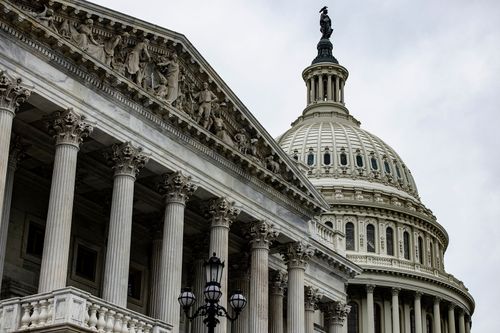Recess yields progress on bipartisan effort to overhaul policing

New progress in the bipartisan legislative effort to overhaul policing has been made on no-knock warrants and chokeholds, according to a source familiar with the discussions, as congressional staffers spent recess working to hammer out key issues that remain.
Sens. Cory Booker, a New Jersey Democrat, and Tim Scott, a South Carolina Republican, and Rep. Karen Bass, a California Democrat, have been leading the charge to craft a bipartisan bill that can pass the 60-vote threshold in the United States Senate, and with the chamber returning to Washington on Monday, in-person talks between the key negotiators are expected to continue.
Progress has also been made on what’s known as the 1033 program, which allows for the transfer of military equipment from the Department of Defense to state and local police departments, according to the source familiar. That leaves qualified immunity, which protects police officers from civil lawsuits, as one of the last remaining major issues to be addressed by the group. Scott has proposed shifting the responsibility to police departments as opposed to individual officers. Democrats have said both the officers and departments should be held accountable.
Another key sticking point includes Section 242, a part of federal law which sets the standard for criminally prosecuting police officers. The George Floyd Justice in Policing Act, which passed the House with no Republican support in March, calls for changing the language so police officers can be charged for “reckless” conduct as opposed to the current “willful” misconduct, a change that would lower the standard for prosecuting police officers. Scott has said the issue is a red line for him.
“It’s a negotiation. Nothing is ever off the table until the deal is done,” another source familiar with the talks told CNN last week.
White House involvement
Through senior aides Susan Rice, director of the Domestic Policy Council, and Cedric Richmond, director of the White House Office of Public Engagement, the White House is closely monitoring the congressional police reform talks through communications with multiple participants. The White House Office of Legislative Affairs and White House Counsel’s office are also involved. As Republicans and Democrats alike cite progress, President Joe Biden’s team remains hopeful but cautious.
“It seems like it goes up and down,” a senior official said.
In addition to outreach to individual members of Congress, senior leadership at the White House has also been in close contact with the Senate Judiciary Committee and Senate leadership as the talks continue.
Biden made police reform one of his key campaign promises and called on Congress to act during his address to a joint session of Congress last week.
“I know Republicans have their own ideas and are engaged in very productive discussions with Democrats in the Senate,” Biden said. “We need to work together to find a consensus but let’s get it done next month by the first anniversary of George Floyd’s death.”
Timeline for a deal
Like Biden, Bass has also said she hopes the group will have a bill to Biden’s desk by May 25, the one-year anniversary of Floyd’s death.
But that could prove to be a very ambitious goal. Once the new work period begins on Monday, they will have just 15 days to get a deal done by the anniversary.
Booker and Scott have been careful not to tie themselves to a deadline, instead often answering questions about a May 25 timeline by saying progress is being made and there is a sense of urgency shared by all parties involved.
Last week, just before recess began, there was a new sign of momentum as Booker, Scott and Bass expanded their discussions to a larger group that included Democratic Sen. Dick Durbin of Illinois, Republican Sen. Lindsey Graham of South Carolina, Democratic Rep. Josh Gottheimer of New Jersey and Republican Rep. Pete Stauber of Minnesota.
After the meeting, Booker pledged the group will continue to meet “until we get this done.”
“I think the best thing we can do is keep in mind why we’re doing what we’re doing,” Scott said when asked about a timeline for a deal after the meeting. “And what we’re doing is trying to make our communities and our law enforcement community easier to work together. And I think as long as we keep that as our focus, we will work expeditiously to get a solution.”